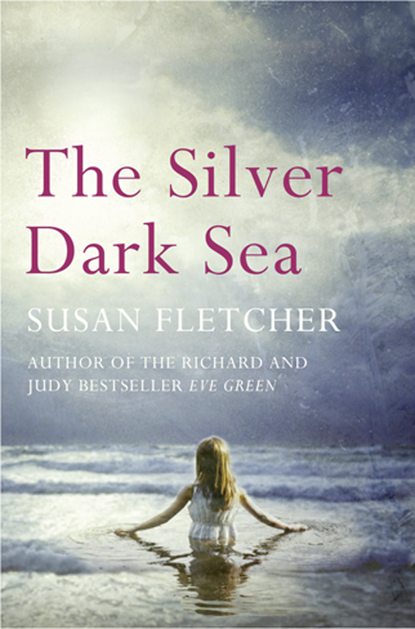По всем вопросам обращайтесь на: info@litportal.ru
(©) 2003-2024.
✖
The Silver Dark Sea
Автор
Год написания книги
2018
Настройки чтения
Размер шрифта
Высота строк
Поля
Can you see him now? Legs that seem to have no end? The dark matting of his hair that, if a hand was laid there, would cover that hand? His body was hard, too – harder than other bodies, as if he was not only skin and bones. Was he even human? He felt stronger than all the humans I’d known and it made me ache – this strength under my palms, this anchor.
But I do not touch him yet.
I have not even met him – but I will.
He is looking at the ceiling of the mending room. He looks without blinking – the white paint, the single hair-thin crack.
He can smell the sea. Also he can hear it, and he lifts his head. He tries to sit up, and in doing this there is the bed’s creak, and the dragging sound of his dry heels against the cotton sheets.
Curtains move; the window is open.
He can also hear footsteps. They grow louder. Pat, pat.
* * *
Tabitha knows he is awake before she comes into the room. A nurse’s intuition, perhaps, or a woman’s. She pushes the door and she is right – he is there, trying to sit up. His arms are bent and he is wincing. She puts down the water she is carrying and says careful! Careful! Here – let me help …
He has been sleeping for over thirty-six hours. In that time she has watched him turn, heard him murmur; she has held glasses of water to his lips, whispered drink – and he has drunk. So she knows that he is real enough. But seeing him now – awake, moving … He is even larger as he moves. His chest is defined as chests, on Parla, don’t tend to be so that a deep cleft runs down from his throat to his waist.
He exhales, as if pained.
Are you OK?
A thick, even beard. Hair like a thatch. There is sand, also. Last night, she’d cleaned sand from his skin, ears and nostrils but not from his hair – and it is on the pillow, in the crook of his elbow and in the creases of the sheets.
Do you understand me?
He gives a single nod.
Good. Tabitha blushes. The question seems childish. She hands him the glass of water. You need to keep drinking.
He takes the glass.
Where does she start? What can she say? Do you know where you are?
A flinch, which is no.
On an island called Parla. You were found on a beach the night before last. Do you remember the beach?
She watches him drink – the long draws of water and the movement of his throat. He drains the glass, lowers it. A beach?
Yes. A stony one. She takes the glass from him.
The man shakes his head.
I’m the nurse. Tabitha. Bright. My father kept a lighthouse so it’s a fitting surname. Her smile is quick. Your name?
For a moment he looks at her. Then he turns his stare away and looks out of the window, at the dark-green nettle patch and the sea beyond. He is thinking. He thinks for a long time and in that time Tabitha looks at his profile, the lines on his forehead. She hears the grandfather clock in the hall. I don’t know –
You don’t know your name? Really?
I’m sorry …
It’s alright. It will come, I’m sure. No headaches?
No. And he looks troubled, then. He looks lost, so that Tabitha lays her hand on his forearm. It is all she can think of doing. He has come from the sea like driftwood. He has no memory and marks on his hand that she cannot fathom, and this is like an old, old tale that is hard to have faith in, in modern times. She is sixty-five, and it’s the twenty-first century, and surely there are no mysteries left? Falling in love is serotonin. Phosphorescent water is not God’s light.
Yet here he is. Sea-smelling.
Do you remember anything?
Being in the water.
Good. That’s something. She pats his arm. How about food? You must be hungry.
No answer.
A drink, then? Tea?
He says tea … And he says it as if he does not know what tea could be, or perhaps he is agreeing to it – Tabitha can’t tell which. But he says tea … again, and he looks grateful, very tired.
Tea for two. She smiles. I’ll be back in a minute. You stay put.
She goes to the kitchen, feeling happy. She puts the kettle on.
The wind lifts a flake of rust from a car, at High Haven. The ivy that grows on the minister’s house taps against the wood.
Alfie Moss is by the primary school. It is closed for the summer but he stands in its playground all the same. He does a clumsy somersault on the fence and when he lands he wipes his nose on his bare arm.
The primary school is three rooms in a grey stone building. It has a single classroom with its desk, globe, and its stack of plastic drawers with the children’s names taped on them. It has a whiteboard at one end that squeaks when his mother writes on it. There is also a tiny kitchen and beside it there are two toilet cubicles – one with a pink door, and one with blue. Alfie uses the blue one, as do the three other boys that catch the boat from Utta. He doesn’t live on Utta; Alfie lives next door.
Alfie steps back from the fence. He is checking his palms for splinters when he hears footsteps, looks up. His mother is coming down the path; her hair is a cloud and the gold cross around her neck catches the light as she comes. She shouts Alfie! We’re late – into the car.
They drive down towards the harbour – past the viewpoint, and the airstrip. Alfie presses his nose to the glass. He squints at each person who passes. He has heard there is a new man on the island – he came from the sea and he has no name. He has heard, too, that he looks a bit like Uncle Tom. But Alfie is too young to really remember his uncle Tom.
* * *
Three times a week the ferry comes and goes. For nearly a century, a boat called the Morning Star has made its way across the sea, tilting left to right and followed by gulls. This ferry – the vessel that sits in the harbour now – is the third to be called this, so it has Morning Star III painted on its prow and perhaps it is larger than the Stars that came before. But it has the same blue bottom. The same white railings with lifebelts on.
On two days – Monday and Wednesday – it leaves Parla and sails directly to the mainland and back. It is nearly a two-hour journey in each direction when the weather is kind, or when Ed does not peel away from the usual route to follow a dolphin pod or a whale’s spray. In the summer, he often does this – for the passengers are mostly holidaymakers who live in cities, far from the coast. For them, a flash of back in the water is a gift, and he loves how they point, say look! There! In choppy sea the journey may take over three hours. In high winds or high water, the Star does not run at all.
On Fridays, it makes its way over via the other isles. For these other, smaller islands this is the only ferry service that they have – one boat every seven days. Parla is busy and easy to reach compared to these strangely shaped rocks: Utta, with its standing stones and cluster of salt-walled homes; Say, with the many sea stacks that gannets whiten; and Cantalay, where there is a single sheep farm and a ruined fort that the wind whistles through in winter. Merme is uninhabited, now. No boats go to it. Nothing does, except the puffins and they do not stay long.
Today it’s Friday. Today, the Star will go out to these islands. It will creep in and out of their harbours, carry lives and luggage elsewhere. The ferry is fuelled and ready. Its white railings are shining in the morning light. The metal gangplank which the passengers must walk upon is also white and when it is lowered down onto the quayside there is a sudden, hard chime which sends up the gulls, makes a black cat flinch down against the ground.
It is nine twenty in the morning. There is a slight glint of dew on the fields and there is already heat in the sun. Most of the islanders are at the harbour. The grass verge that leads down to it has their cars parked upon it – cars with no wing mirrors or hubcaps, and most have dents in their sides. Hester steps out of a hatchback, pulls open the door behind her seat saying out out out to Alfie.
As they walk down, they pass a purple car. Its passenger door is open and a small, denim-covered bottom is beside it; its owner’s head and body are still inside the car. There is the smell of baking, and ginger. Hester glances inside as she passes – she sees the dark butter icing of a chocolate cake. Alfie does too – Mum, look … They hurry down to the Morning Star.
Другие электронные книги автора Susan Fletcher
Corrag




 0
0






